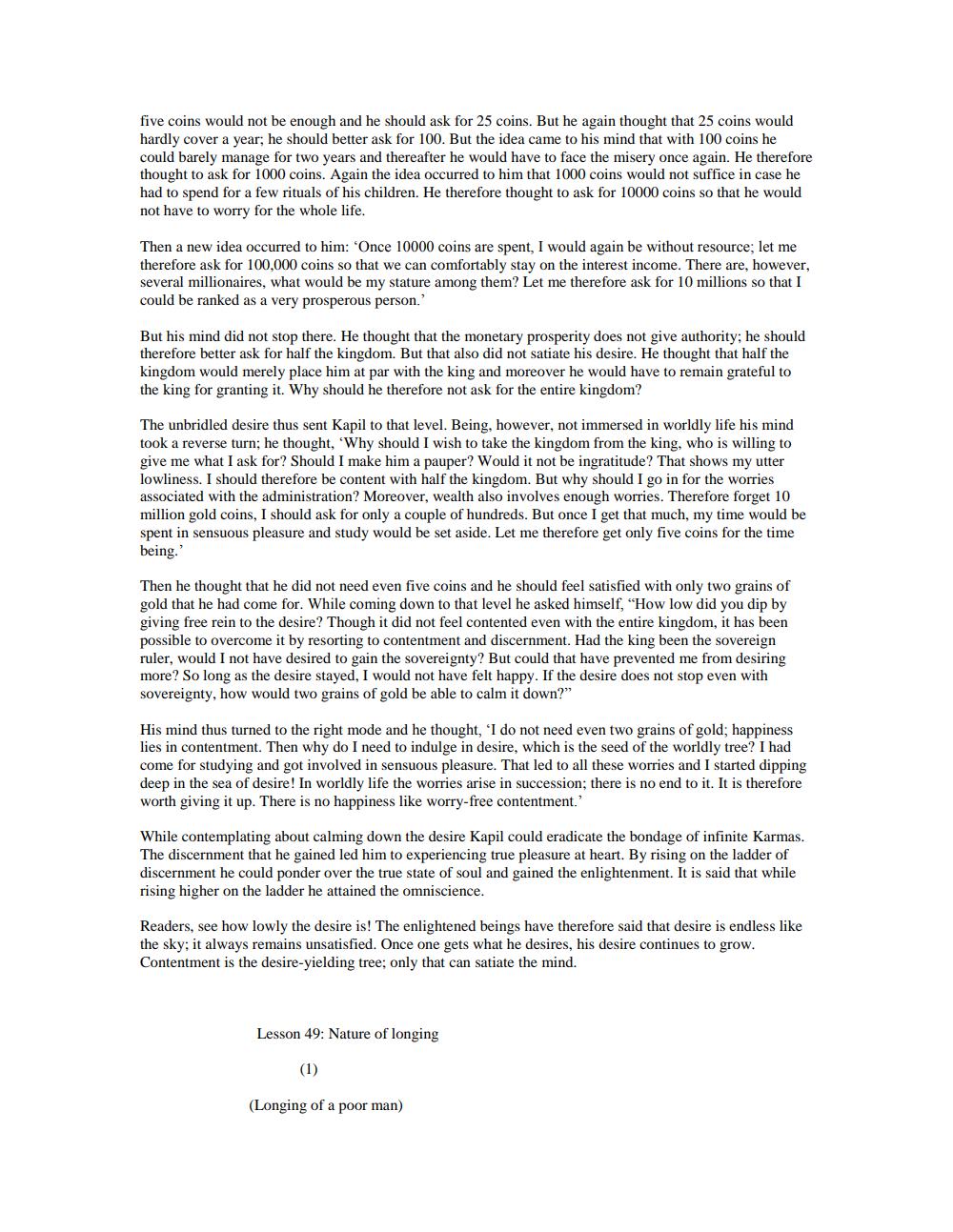________________
five coins would not be enough and he should ask for 25 coins. But he again thought that 25 coins would hardly cover a year, he should better ask for 100. But the idea came to his mind that with 100 coins he could barely manage for two years and thereafter he would have to face the misery once again. He therefore thought to ask for 1000 coins. Again the idea occurred to him that 1000 coins would not suffice in case he had to spend for a few rituals of his children. He therefore thought to ask for 10000 coins so that he would not have to worry for the whole life.
Then a new idea occurred to him: 'Once 10000 coins are spent, I would again be without resource; let me therefore ask for 100,000 coins so that we can comfortably stay on the interest income. There are, however, several millionaires, what would be my stature among them? Let me therefore ask for 10 millions so that I could be ranked as a very prosperous person.'
But his mind did not stop there. He thought that the monetary prosperity does not give authority; he should therefore better ask for half the kingdom. But that also did not satiate his desire. He thought that half the kingdom would merely place him at par with the king and moreover he would have to remain grateful to the king for granting it. Why should he therefore not ask for the entire kingdom?
The unbridled desire thus sent Kapil to that level. Being, however, not immersed in worldly life his mind took a reverse turn; he thought, 'Why should I wish to take the kingdom from the king, who is willing to give me what I ask for? Should I make him a pauper? Would it not be ingratitude? That shows my utter lowliness. I should therefore be content with half the kingdom. But why should I go in for the worries associated with the administration? Moreover, wealth also involves enough worries. Therefore forget 10 million gold coins, I should ask for only a couple of hundreds. But once I get that much, my time would be spent in sensuous pleasure and study would be set aside. Let me therefore get only five coins for the time being.'
Then he thought that he did not need even five coins and he should feel satisfied with only two grains of gold that he had come for. While coming down to that level he asked himself, “How low did you dip by giving free rein to the desire? Though it did not feel contented even with the entire kingdom, it has been possible to overcome it by resorting to contentment and discernment. Had the king been the sovereign ruler, would I not have desired to gain the sovereignty? But could that have prevented me from desiring more? So long as the desire stayed, I would not have felt happy. If the desire does not stop even with sovereignty, how would two grains of gold be able to calm it down?"
His mind thus turned to the right mode and he thought, 'I do not need even two grains of gold; happiness lies in contentment. Then why do I need to indulge in desire, which is the seed of the worldly tree? I had come for studying and got involved in sensuous pleasure. That led to all these worries and I started dipping deep in the sea of desire! In worldly life the worries arise in succession; there is no end to it. It is therefore worth giving it up. There is no happiness like worry-free contentment.'
While contemplating about calming down the desire Kapil could eradicate the bondage of infinite Karmas. The discernment that he gained led him to experiencing true pleasure at heart. By rising on the ladder of discernment he could ponder over the true state of soul and gained the enlightenment. It is said that while rising higher on the ladder he attained the omniscience.
Readers, see how lowly the desire is! The enlightened beings have therefore said that desire is endless like the sky; it always remains unsatisfied. Once one gets what he desires, his desire continues to grow. Contentment is the desire-yielding tree; only that can satiate the mind.
Lesson 49: Nature of longing
(1)
(Longing of a poor man)




